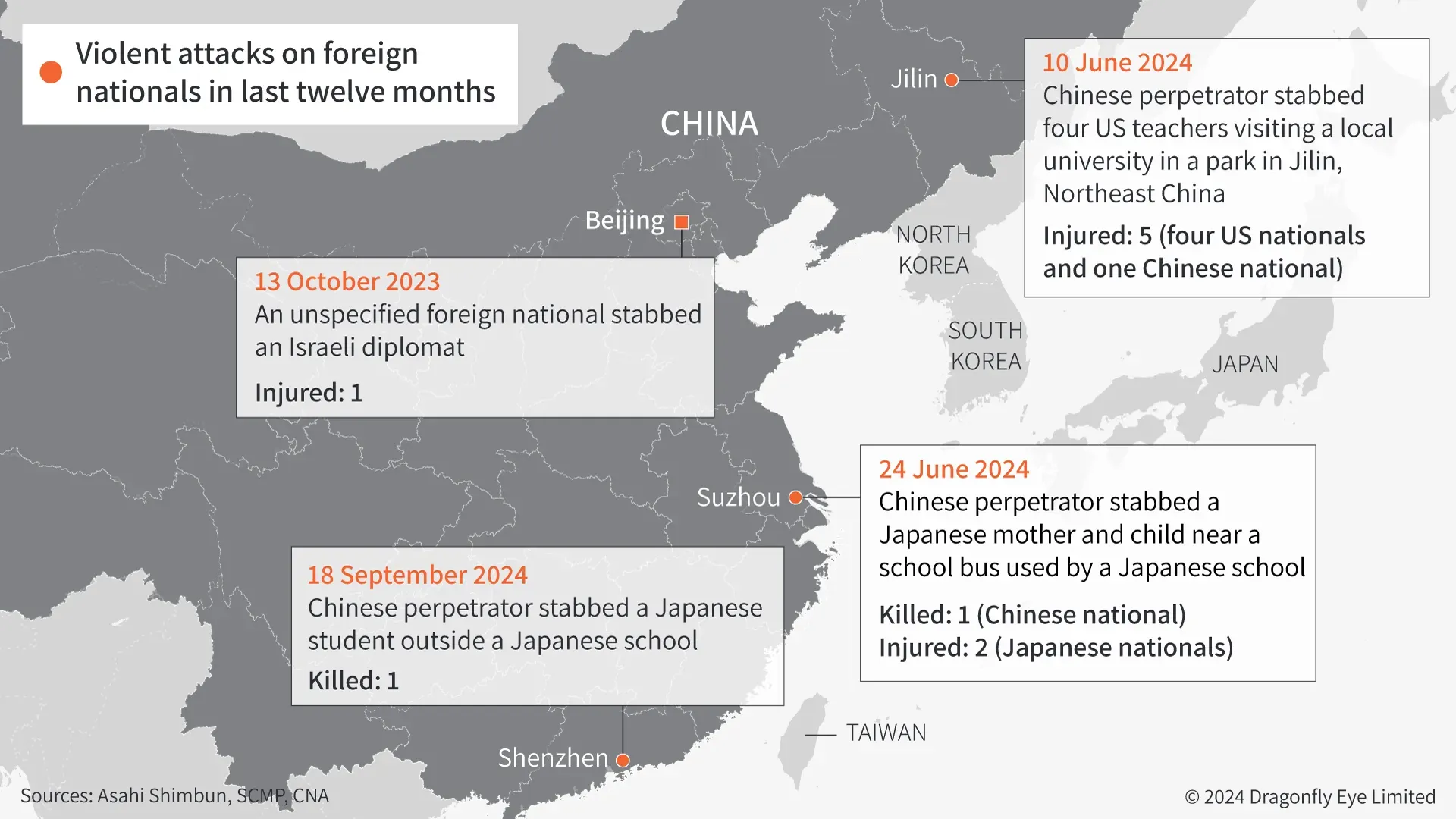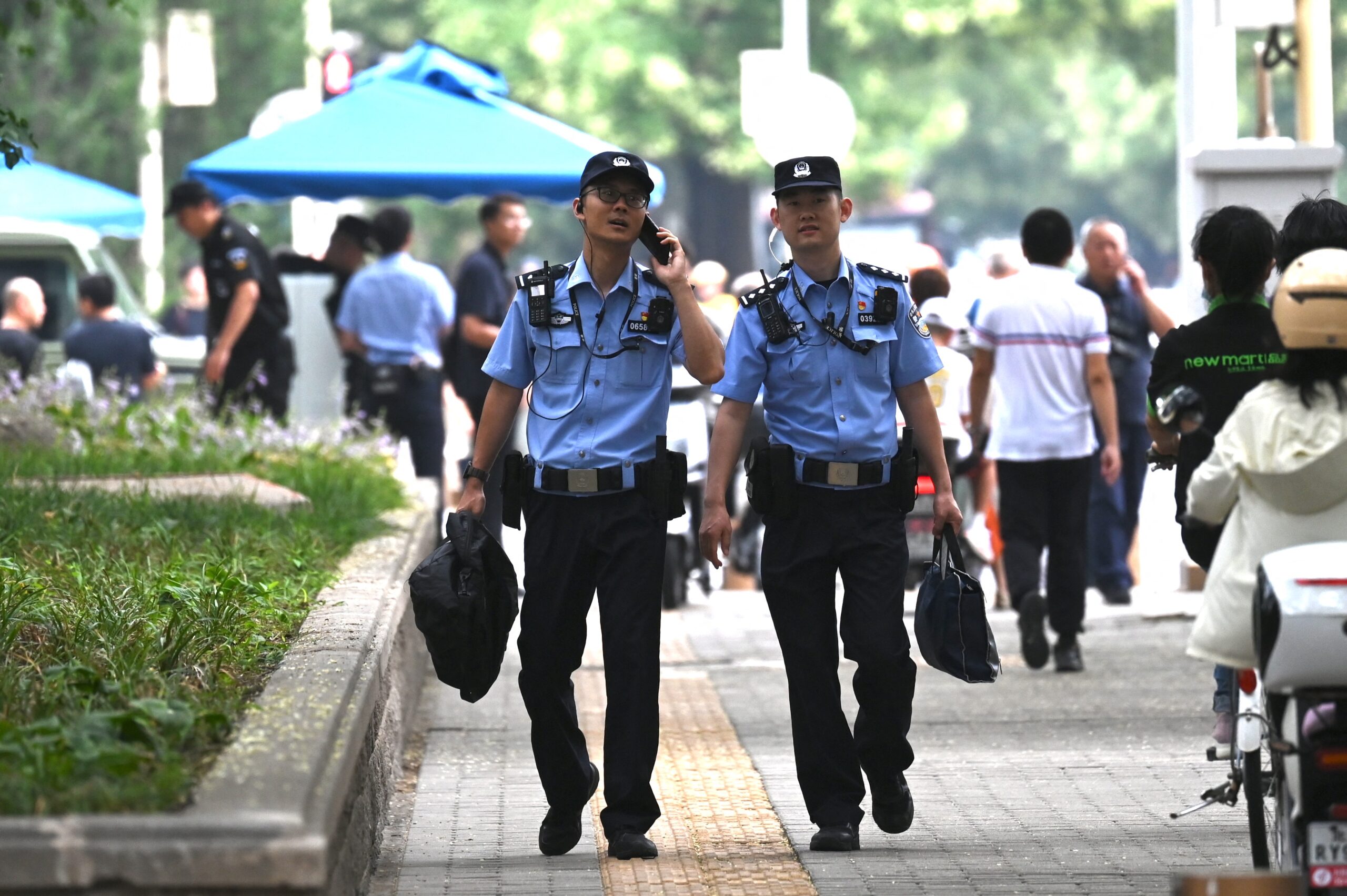There have been four high-profile stabbing incidents in the past twelve months targeting Israeli, Japanese and US nationals
This assessment was issued to clients of Dragonfly’s Security Intelligence & Analysis Service (SIAS) on 26 September 2024.
- Isolated violent attacks against foreign nationals, such as stabbings, are becoming more frequent (albeit still very rare overall)
- Overall China remains a largely safe destination for foreign visitors with few incidents of violent crime compared to many other countries
Violent attacks against foreign nationals in China appear to be on the rise. A man acting alone stabbed a Japanese student outside a Japanese school in Shenzhen on 18 September. This was the second attack on Japanese schoolchildren (and the fourth against foreigners) over the past year based on international media reporting. The perpetrators of all of these attacks seemed to be inspired at least in part by extreme nationalism. That said, China is still very safe for foreigners and such incidents are likely to remain rare. Any further attack would probably target US or Japanese nationals.
Extreme nationalist rhetoric driving violence
There have been four high-profile stabbing incidents of foreign nationals in China in the past twelve months. That is the highest number for several years, based on our monitoring of local press reporting. These include attacks on US, Israeli and Japanese nationals (see map below). There have been indiscriminate mass stabbing attacks in China over the past decade. This includes at schools, police stations, and most recently this year a hospital and a subway metro station. But these have not typically targeted foreign nationals.

The perpetrators in these recent incidents appear to have been motivated, at least in part, by anti-foreigner sentiment. The authorities have given few details about the attack in September; they only said it was an isolated incident that ‘could happen in any country’. But this is the second such attack on Japanese schoolchildren in the country in three months. And it took place on the anniversary of a historical date associated in China with Japanese imperialism in the 1930s. The other attacks on Israeli and US nationals happened shortly after the invasion of Gaza in October 2023 and amid poor US-China relations.
The attacks seem to be tied to disputes between China and other countries. Already-poor relations and low public sentiment between Beijing and Japan have worsened in recent years, notably due to maritime disputes and misinformation about Japan’s release of wastewater from Fukushima. Signalling this, Japanese officials have asked the Chinese authorities to increase security measures for its nationals in recent days. According to a Japanese media outlet, several firms have since also offered to repatriate staff and their families in the coming months. We have not seen any reports that other companies of other nationalities have done the same.
Attacks likely to remain crude and opportunistic
Any further violent attacks on foreign nationals are likely to be opportunistic and crude. The Chinese security forces are highly effective at preventing mass violence or unrest. The last mass casualty attack took place in 2014, when eight assailants stabbed and killed over 30 people in Kunming train station. But firearms, bombs or other weapons are extremely hard for civilians to access. So at most, attacks would be lone-actor stabbings where foreigners gather, such as near embassy compounds, international schools, or bars.
The government will probably struggle to prevent further such attacks. Major internet platforms including Tencent, Sina Weibo and Netease have in recent days issued statements condemning hate speech and deleted posts and accounts that are spreading ‘anti-Japanese sentiment and extreme nationalism’, according to local media outlets. But the authorities have not announced any new significant measures to counter this sentiment. And such incidents will be difficult for the authorities to thwart, given the seeming lack of an organised group behind these.
Still, a campaign of frequent attacks against foreigners is very unlikely, in our view. Extreme nationalist groups that operate on Chinese online forums often post anti-Japanese content that is misleading or encourages violence. And the state does not appear to be censoring anti-Japanese or nationalist content despite its very efficient censorship system. For instance, state media often broadcasts anti-Japanese shows and movies tied to Japanese imperialism. But the majority of extreme nationalists operate online and rarely if ever organise gatherings or signal their intent to mount attacks.
Image: Police officers patrol outside the Jingxi Hotel, where China’s leaders were conducting the Third Plenum, a key economic meeting, in Beijing, China, on 15 July 2024. Greg Baker/AFP via Getty Images.




